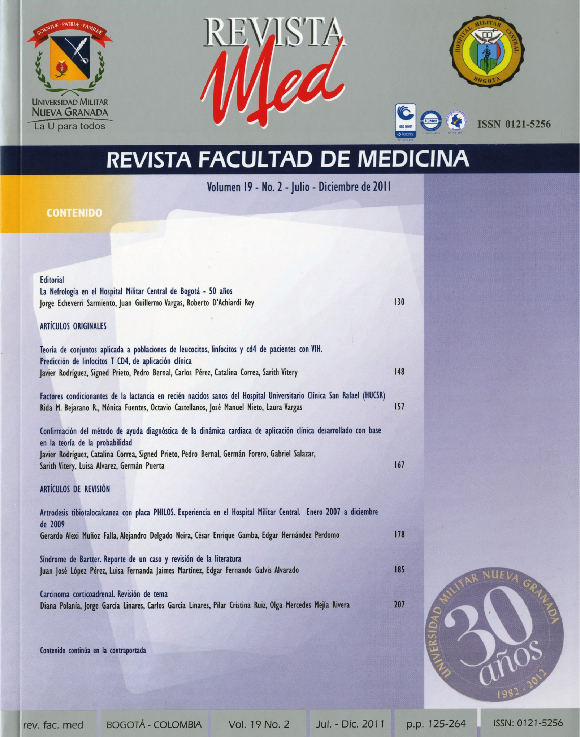Carcinoma corticoadrenal. Revisión de tema
Resumen
Los adenomas son los tumores corticoadrenales más comunes, con una prevalencia del 4%, siendo los carcinomas corticoadrenales raros, con una incidencia de 1 caso por millón de habitantes. La mitad de estos carcinomas son funcionales con diagnósticos más tempranos por los síndromes de exceso de hormonas que producen, a diferencia del restante 50% que es silente, con hallazgo de metástasis al momento del diagnostico en más de la mitad de ellos. Pueden tener una presentación esporádica o hacer parte de síndromes de cáncer familiar con anormalidades en genes que resultan en un imbalance entre oncogenes y genes supresores de tumor; además de constituirse como potenciales marcadores diagnósticos, pronósticos y terapéuticos de esta enfermedad. Ante la sospecha de carcinoma de corteza suprarrenal, deben tenerse en cuenta criterios clínicos, bioquímicos y radiológicos para establecer adecuadamente el diagnóstico, el cual debe confirmarse por histología.
Descargas
Lenguajes:
esReferencias bibliográficas
Fassnacht, M., Libé, R., Kroiss, M., Allolio, B. Nat. Rev. Endocrinol. 7, 323–335 (2011).
Pabon, N., Gomez, C., Garavito, G., Jimenez, C. Rev Colomb Cancerol 2005;9(3):123-129.
Universität Würzburg Offizielle Homepage des Deutsche Nebennierenkarzinom-Registers [online], http://www.nebennierenkarzinom. de/ (2010).
Libe, R., Bertherat, J. Molecular genetics of adrenocortical tumours, from familial to sporadic diseases.Eur J Endocrinol 2005;153:477-87.
Geller, J., Mertens, R., Weiss, L. Adrenocortical carcinoma many questions remain unanswered. The Endocrinologist 2005;15:3009-312.
Ribeiro, R., Pinto, E., Zambetti, G. Familial predisposition to adrenocortical tumors: Clinical and biological features and management strategies. Best Practice & Research Clinical Endocrinology & Metabolism 24 (2010) 477e490.
Tissier, F., Cavard, C., Groussin, L et al. Mutations of beta-catenin in adrenocortical tumors: activation of the Wnt signaling pathway is a frequent event in both benign and malignant adrenocortical tumors. Cancer Research 2005; 65: 7622e7627.
Bisgaard, M., Fenger, K., Bulow S et al. Familial adenomatous polyposis (FAP): frequency, penetrance, and mutation rate. Human Mutation 1994; 3: 121e125.
DeChiara, T., Robertson EJ & Efstratiadis A. Parental imprinting of the mouse insulin-like growth factor II gene. Cell 1991; 64: 849e859.
Lapunzina, B., del Campo, C., Delicado, N.et al. Clinical guide to the management of patients with BeckwitheWiedemann syndrome. Anales de Pediatria (Barcelona) 2006; 64: 252e259.
Teh SH & Ong GB. Early presentation of right adrenal mass, hepatoblastoma and hepatic cavernous haemangioma in BeckwitheWiedemann Syndrome. The Medical Journal of Malaysia 2007; 62: 345e346.
Schimmer, B. & White, P. Minireview: steroidogenic factor 1: its roles in differentiation, development, and disease. Mol. Endocrinol. 24, 1322–1337 (2010).
Sbiera, S. et al. High diagnostic and prognostic value of steroidogenic factor‑1 expression in adrenal tumors. J. Clin. Endocrinol. Metab. 95, E161–E171 (2010).
Bernini, G. et al. Angiogenesis in human normal and pathologic adrenal cortex. J. Clin. Endocrinol. Metab. 87, 4961–4965 (2002).
Isobe, M., Bravo, E., Givol, D et al. Localization of gene for human p53 tumour antigen to band 17p13. Nature 1986; 320: 84e85.
Bertherat, J., Gimenez, R. New insights in the genetics of adrenocortical tumours, pheochromocytomas and paragangliomas. Horm Metab Res 2005;37:384-90.
Sidhu, S., Gicquel, C., Bambach C et al. Clinical and molecular aspects of adrenocortical tumourigenesis. ANZ J Surg 2003;73:727-38.
Zambetti, G. The p53 mutation “gradient effect” and its clinical implications. Journal of Cellular Physiology 2007; 213: 370e373.
Gonzalez, K., Noltner, K., Buzin, C et al. Beyond LieFraumeni Syndrome: clinical characteristics of families with p53 germline mutations. Journal of Clinical Oncology 2009; 27: 1250e1256.
Beuschlein, F., Fassnacht, M., Klink, A., Allolio, B. & Reincke, M. ACTH-receptor expression, regulation and role in adrenocortial tumor formation. Eur. J. Endocrinol. 144, 199–206 (2001).
Stewart, P. M., Walker, B. R., Holder, G., O’Halloran, D. & Shackleton, C. H. 11 beta-Hydroxysteroid dehydrogenase activity in Cushing’s syndrome: explaining the mineralocorticoid excess state of the ectopic adrenocorticotropin syndrome. J. Clin. Endocrinol. Metab. 80, 3617–3620 (1995).
Universität Würzburg Offizielle Homepage des Deutsche Nebennierenkarzinom-Registers [online], http://www.nebennierenkarzinom. de/ (2010).
Hyodo, T., Megyesi, K., Kahn, C. R., McLean, J. P. & Friesen, H. G. Adrenocortical carcinoma and hypoglycemia: evidence for production of nonsuppressible insulin-like activity by the tumor. J. Clin. Endocrinol. Metab. 44, 1175–1184 (1977).
Francois C, Rangachari B, Bova D. Case report: mammography and sonography of pathologically proven adrenal cortical carcinoma metastasic to the breast. Am J Roentgenol 2005;184:1279-81.
European Network for the Study of Adrenal Tumours Adrenocortical carcinomas [online], http://www.ensat.org/acc. htm (2010).
Fassnacht, M. & Allolio, B. Clinical management of adrenocortical carcinoma. Best Pract. Res. Clin. Endocrinol. Metab. 23, 273–289 (2009).
Schteingart, D., Doherty, G., Gauger, P. Management of patients with adrenal cancer: recommendations of an international consensus conference. Endocrine Related Cancer 2005;12:667-80.
Ilias, I., Sahdev, A., Reznek, R. H., Grossman, A. B. & Pacak, K. The optimal imaging of adrenal tumours: a comparison of different methods. Endocr. Relat. Cancer 14, 587–599 (2007).
Groussin, L. et al. 18F-Fluorodeoxyglucose positron emission tomography for the diagnosis of adrenocortical tumors: a prospective study in 77 operated patients. J. Clin. Endocrinol. Metab. 94, 1713–1722 (2009).
Hahner, S. et al. [123 I]Iodometomidate for molecular imaging of adrenocortical cytochrome.
Hennings, J. et al. [11C]metomidate positron emission tomography of adrenocortical tumors in correlation with histopathological findings. J. Clin. Endocrinol. Metab. 91, 1410–1414 (2006)
Sasano, H. et al. Transcription factor adrenal 4 binding protein as a marker of adrenocortical malignancy. Hum. Pathol. 26, 1154–1156 (1995).
Aiba M, Fujibayashi M. Histopathological diagnosis and prognostic factors in adrenocortical carcinoma. Endocr Pathol 2005;16:13-22.
Quayle, F. J. et al. Needle biopsy of incidentally discovered adrenal masses is rarely informative and potentially hazardous. Surgery 142, 497–502 (2007).
Murphy, M. M. et al. Trends in adrenalectomy: a recent national review. Surg. Endosc. 24, 2518–2526 (2010).
Porpiglia, F. et al. Retrospective evaluation of the outcome of open versus laparoscopic adrenalectomy for stage I and II adrenocortical cancer. Eur. Urol. 57, 873–878 (2010).
Brix, D. et al. Laparoscopic versus open adrenalectomy for adrenocortical carcinoma: surgical and oncologic outcome in 152 patients. Eur. Urol. 58, 609–615 (2010).
Terzolo, M. et al. Adjuvant mitotane treatment for adrenocortical carcinoma. N. Engl. J. Med. 356, 2372–2380 (2007).
Huang, H. & Fojo, T. Adjuvant mitotane for adrenocortical cancer—a recurring controversy. J. Clin. Endocrinol. Metab. 93, 3730–3732 (2008).
Terzolo, M., Fassnacht, M., Ciccone, G., Allolio, B. & Berruti, A. Adjuvant mitotane for adrenocortical cancer- -working through uncertainty. J. Clin. Endocrinol. Metab. 94, 1879–1880 (2009).
Fassnacht, M. et al. Improved survival in patients with stage II adrenocortical carcinoma followed up prospectively by specialized centers. J. Clin. Endocrinol. Metab. 95, 4925–4932 (2010).
Terzolo, M., Fassnacht, M., Ciccone, G., Baudin, E., Haak, H., Berruti, A. Efficacy of Adjuvant Mitotane Treatment in Prolonging Recurrence-free Survival in Patients With Adrenocortical Carcinoma at Low-intermediate Risk of Recurrence. 2008-2014
US National Institutes of Health Clinicaltrials.gov [online], http://clinicaltrials.gov/ct2/show/NCT00777244 (2010).
Daffara, F. et al. Prospective evaluation of mitotane toxicity in adrenocortical cancer patients treated adjuvantly. Endocr. Relat. Cancer 15, 1043–1053 (2008).
Polat, B. et al. Radiotherapy in adrenocortical carcinoma. Cancer 115, 2816–2823 (2009).
Sabolch, A. et al. Adjuvant and definitive radiotherapy for adrenocortical carcinoma. Int. J. Radiat. Oncol. Biol. Phys. doi:10.1016/j.ijrobp.2010.04.030.
Erdogan, I. et al. Impact of surgery on clinical outcome in patients with recurrence of adrenocortical carcinoma. Endocrine Abstracts (10th European Congress of Endocrinology), 20, P194 (2009).
Khan, T. S. et al. Streptozocin and o,p’DDD in the treatment of adrenocortical cancer patients: long-term survival in its adjuvant use. Ann. Oncol. 11, 1281–1287 (2000).
Berruti, A. et al. Etoposide, doxorubicin and cisplatin plus mitotane in the treatment of advanced adrenocortical carcinoma: a large prospective phase II trial. Endocr. Relat. Cancer 12, 657–666 (2005).
Sperone, P. et al. Gemcitabine plus metronomic 5‑fluorouracil or capecitabine as a second-/third-line chemotherapy in advanced adrenocortical carcinoma: a multicenter phase II study. Endocr. Relat. Cancer 17, 445–453 (2010).
Castinetti, F. et al. Merits and pitfalls of mifepristone in Cushing’s syndrome. Eur. J. Endocrinol. 160, 1003–1010 (2009).
Johanssen, S. & Allolio, B. Mifepristone (RU 486) in Cushing’s syndrome. Eur. J. Endocrinol. 157, 561–569 (2007).
Carden, C. P. et al. Phase I study of intermittent dosing of OSI‑906, a dual tyrosine kinase inhibitor of insulin-like growth factor‑1 receptor (IGF-1R) and insulin receptor (IR) in patients with advanced solid tumors. J. Clin. Oncol. 28 (Suppl.), abstr 2530 (2010).
Bauditz, J., Quinkler, M. & Wermke, W. Radiofrequency thermal ablation of hepatic metastases of adrenocortical cancer—a case report and review of the literature. Exp. Clin. Endocrinol. Diabetes 117, 316–319 (2009).
Bilimoria, K. Y. et al. Adrenocortical carcinoma in the United States: treatment utilization and prognostic factors. Cancer 113, 3130–3136 (2008).







.png)





